The Event on Sunday, 5th August 2018
2018 had enjoyed a long, hot summer and the 5th August was no exception. I was rostered as steam driver with Dave P. as fireman and Colin D. as cleaner on the second day of the two-day event. As I walked to the Locomotive Shed to sign-on it was still quiet. Our 7-coach train was waiting in the platform and a large, white marquee has been erected adjacent to the north end of the platform for the wartime entertainments.
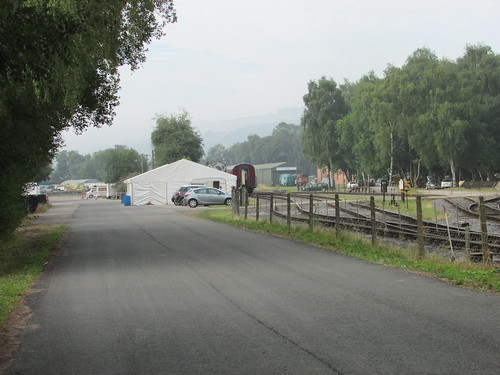
Peak Rail 1940s Weekend 2018: Looking south towards Rowsley Station on my arrival.
As usual, the wooded area opposite the station had become a series of military encampments and the re-enactors were starting to emerge from their tented accommodation and prepare breakfast over a number of campfires.
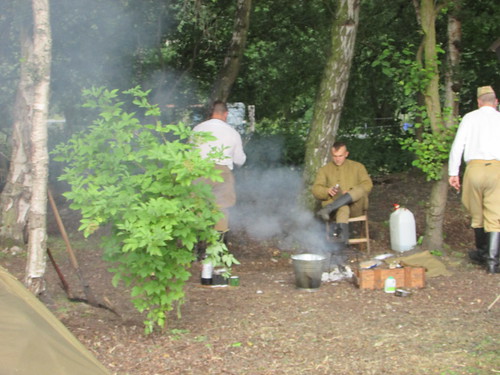
Peak Rail 1940s Weekend 2018: Breakfast in camp.
As well as the encampments and a number of replica military vehicles, there was an imposing replica Messerschmitt Bf109e (which, I later learned, incorporated some parts of a genuine wartime aircraft).
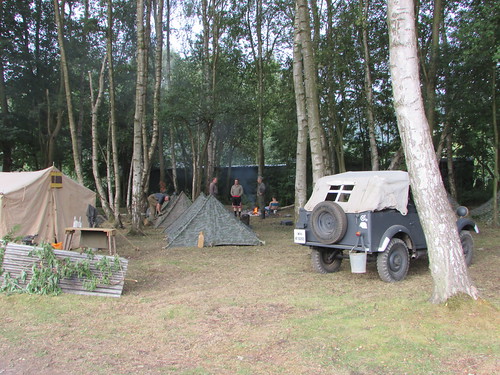
Peak Rail 1940s Weekend 2018: The German Camp.
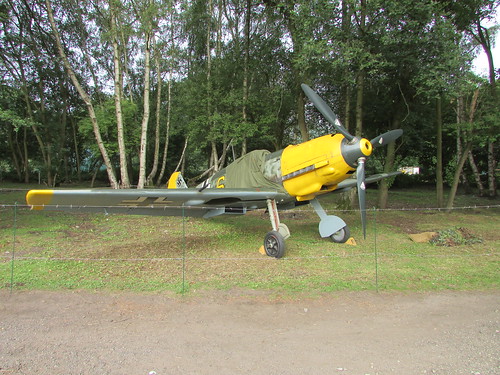
Peak Rail 1940s Weekend 2018: Messerschmitt Bf109e.
Unusually, our locomotive (Austerity tank No. 72) had been turned to face north and we were to work at the north end of the train, top and tailing with 'Penyghent' at the south end. This seems to be the practice for the '1940s Weekend' and I presume it's to avoid the continuous rumble of a large diesel engine standing right outside the marquee when the performers are singing and dancing. It makes a nice change to be 'the other way round' (as long as the driver can remember the 'stop marks' for bringing the train to a stand at Darley Dale and Rowsley).
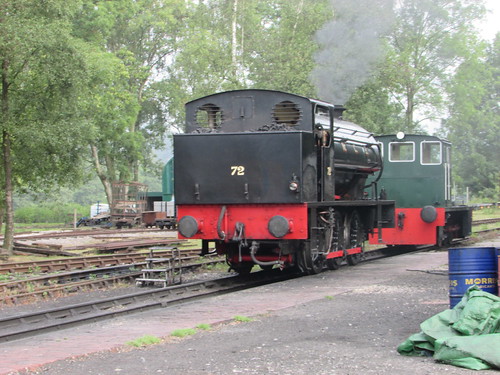
Peak Rail 1940s Weekend 2018: No. 72 'brewing-up' on the outside pit.
Dave and Colin had the engine warming-up nicely, so I was able to concentrate on oiling-round and carrying out the daily exam. Later, the crew arrived to prepare 'Penyghent'. Both locomotives moved across to the station and coupled onto the 7-coach train. Of course, on the journey to Matlock, No. 72 was "tail-end Charlie" so we'd have little to do. Departures are often a bit late, waiting for booked parties to arrive but I think our first train was close to 'right time'. 'Penyghent' made the booked stop at Darley Dale and then continued to Matlock Town.
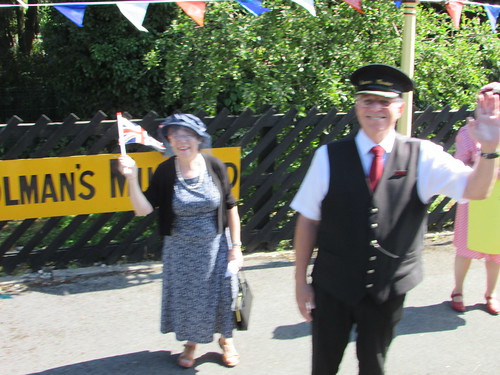
Peak Rail 1940s Weekend 2018: Darley Dale Up Platform.
At Matlock Town, 'Penyghent' surrendered the token to us for the return journey when we would have a chance to do some work. The Guard had given us the load as 385 tons nett - 7 coaches plus Penyghent trying not to do anything unless requested. Gross weight is obtained by adding in the weight of the passengers, around one ton for every 15 passengers. I talked about train weights and gradients in a post about the '1940s Weekend' in 2013 here and I copy below the gradient diagram from that post.
 Gradient Diagram Ambergate - Bakewell
Gradient Diagram Ambergate - Bakewell
The initial run from Matlock Town to passing Matlock Riverside is a downgrade at around 1 in 170 which tends to build up speed with very little steam required. We still have a 5 m.p.h. restriction through the loop at Matlock Riverside, so some braking may be required to comply. Once over the River Derwent bridge, the gradient is against you at about 1 in 400 most of the way to Rowsley. Even with 400 tons on the drawbar, that's not much of a challenge for an Austerity tank at the line speeds allowed and 'first valve' on the regulator will normally suffice. The hardest part is probably stopping gently at Rowsley without overshooting the 'mark' so that water can be taken from the rank wagon at the end of the platform.
There was wartime music coming from the marquee, being enjoyed by a crowd of visitors, many in uniform or period clothing. In addition to soft drinks and light refreshments, there was a licensed bar. Hot food and drink was also available at the cafe on the platform.
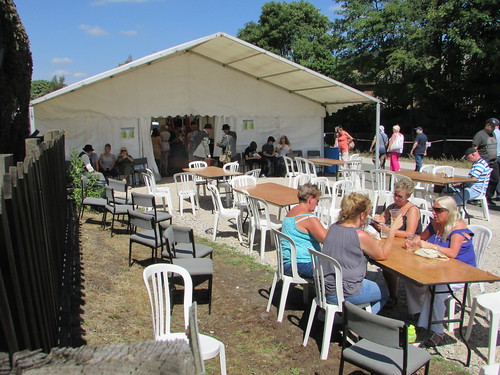
Peak Rail 1940s Weekend 2018: The marquee and outside seating area.
Lots of cars were entering the site and the large car park by the station was rapidly filling up, keeping the marshals helping with parking busy. We made our second round trip, returning to Rowsley to find even more people. At one point, I could see three National Holidays coaches dropping their passengers, turning and parking.
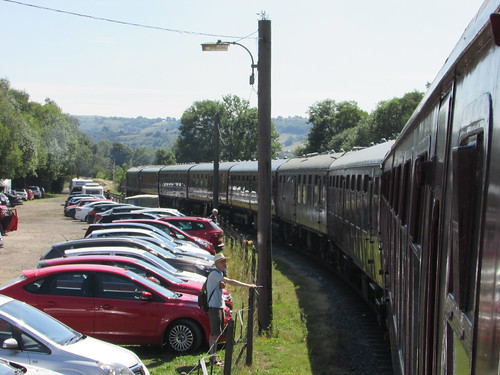
Peak Rail 1940s Weekend 2018: 'Penyghent' sets off from Rowsley with the third service.
By the time we returned on the third round trip, we were quite warm. I usually sport a 'tin helmet' to give a sense of period but it was quite uncomfortable in the warm weather. Dave relaxed on the platform for a while before the fourth departure.
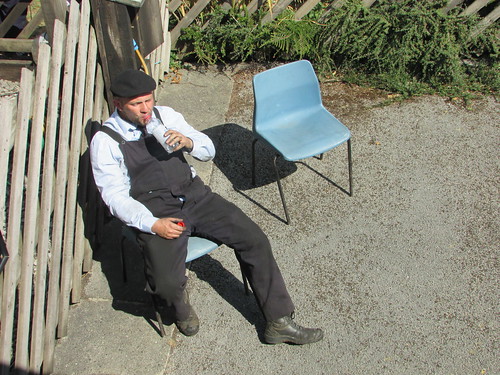
Peak Rail 1940s Weekend 2018: Dave takes hydration prior to the fourth departure.
By the time we left, the platform was packed with visitors, not travelling this time but trying to secure good positions for watching the battle re-enactment which would commence a little later. Well, I can't tell you what happened this year but from previous experience, I know the carefully-constructed displays are well choreographed and usually exciting, with plenty of pyrotechnics.
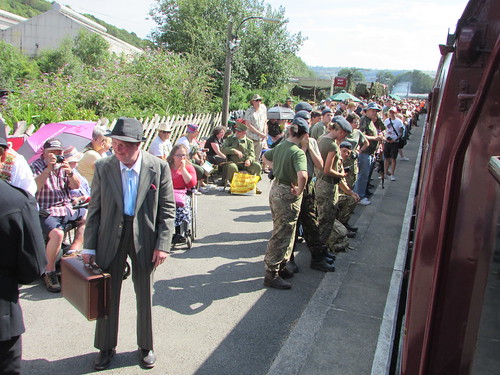
Peak Rail 1940s Weekend 2018: Visitors waiting for the battle re-enactment to commence
Until our line was extended to Matlock Town, our terminus was Matlock Riverside, now rarely used. The vandalised platform shelter has been replaced but not repainted.
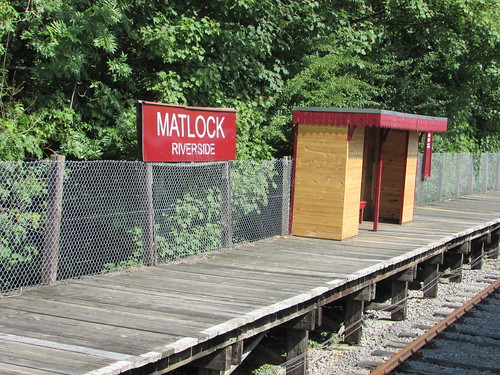
Peak Rail 1940s Weekend 2018: Matlock Riverside. The vandalised shelter has been rebuilt but not repainted.
At Matlock Town, Dave collected the token from Gordon, ready for our departure. On the skyline, Riber Castle still dominates the view. It was built as a family home by a successful industrialist in 1862 but, more recently, has had a chequered history. I think the latest initiative is conversion to flats but I'm not sure of the current status. There's a Wikipedia article here.
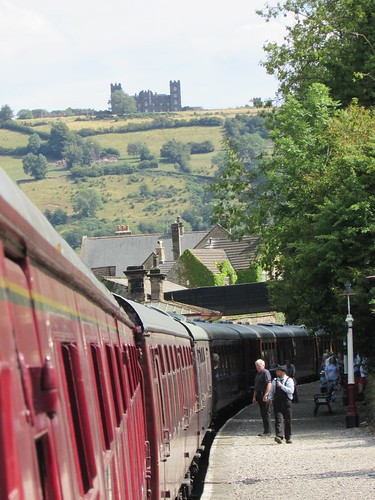
Peak Rail 1940s Weekend 2018: Dave collects the token from Gordon prior our departure to Rowsley.
We made another uneventful trip to Rowsley where the mock battle had finished and many visitors were starting to leave. Just one final round trip remained. At Church Lane, I watched the signalman preparing to collect the Rowsley-Church Lane single line token. Church Lane to Darley Dale is now double track with Absolute Block signalling so no token is required but leaving Darley Dale a token is required for the single line section from Darley Dale to Matlock Town.
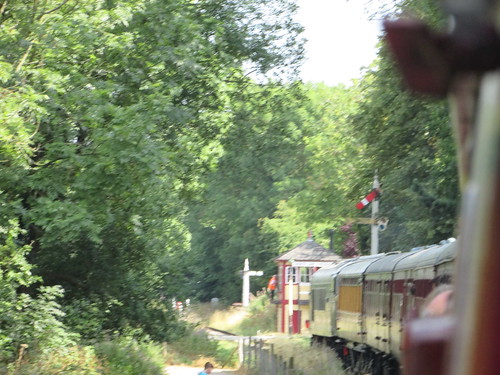
Peak Rail 1940s Weekend 2018: 'Penyghent' approaching Church Lane Crossing box. The signalman is on the landing, ready to receive the Rowsley-Church Lane token.
Back at Rowsley, many of the re-enactors were packing up to leave. I hope they had an enjoyable weekend: as we disposed No. 72, Dave, Colin and I certainly agreed we'd had a good day.
The Event in previous years
Peak Rail first ran this event in 2006 and it's proved very popular.
Peak Rail 1940s Weekend, 2017 (article with link to pictures).
Peak Rail 1940s Weekend, 2016 (article with link to pictures).
Peak Rail 1940s Weekend, 2015 (article with link to pictures).
2014 event (pictures only).
2013 event (article with link to pictures).
2012 event (article with link to pictures).
2009 event (article with link to pictures).
2008 event (article with link to pictures).
2007 event (pictures only).
2006 event (pictures only).
To see all my posts about Peak Rail, select Label 'Peak Rail' or click here.
My pictures
Where necessary, clicking on an image above will display an 'uncropped' view or, alternately, pictures from may be selected, viewed or downloaded, in various sizes, from the albums listed:-
Peak Rail 1940s Weekend 2018.
No. 72 - Austerity Tank.
All my Peak Rail albums.
